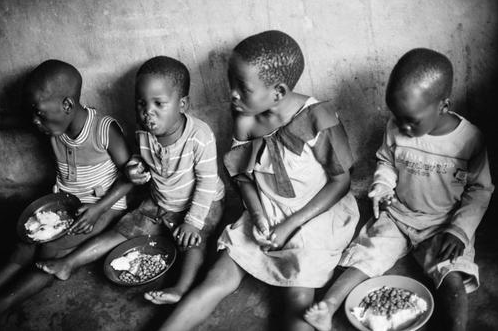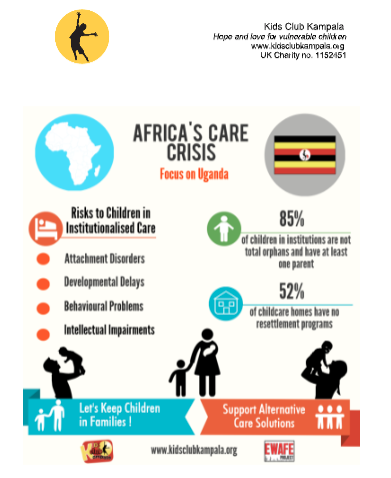

Are All African Children Orphans
by Corrie Fraser on the 01/08/2019
Kids Club Kampala’s Ewafe project for abandoned children provides emergency care for children who have nowhere else to go. Since launching this project in 2013 we have discovered the huge web of misconceptions that exists in Western society regarding orphans and orphan care in Africa. (http://www.kidsclubkampala.org/)
This blog post is written by Kids Club Kampala founder and director Corrie Fraser, here she reflects on the most common misconceptions and why they can be damaging to the development of Africa as a continent, Uganda in particular and more specifically to children themselves.
‘All Poor African children are orphans’:
Perhaps due to decades of over-simplistic fundraising campaigns, emergency appeals and media coverage, many westerners assume that the majority of children living in poverty on the continent are orphaned. I experienced this view first hand when I was invited to the concert of a visiting children’s choir in Scotland. All of the children had travelled from an East African country to sing for a charity, raise funds and tour around the country. The MC of the event was the Scottish host who had welcomed the choir to his community to sing. The choir sang and danced beautifully and a few videos were shown of the personal stories of children who had now graduated from the choir and from school and were leading productive, educated and poverty-free lives. Great! To conclude, the MC stood up to add a few remarks which opened as follows, “Oh look at the little orphans, aren’t they beautiful, don’t you just want to take them all home with you?” Upon hearing this I made a loud gasp and as I looked around not one other person in the audience seemed to share my shock, they all ‘cooed’ and ‘aahd’ in seeming agreement despite the fact that not once in the whole performance had the choirmaster or any member of the choir stated that any of these children were orphans. Why is this attitude problematic? Well, the idea that all children living in poverty on an entire continent are orphaned and need to be ‘taken home’ by Westerners is so simplistic that it ignores the real issues that communities and children are facing. It ignores the real efforts of caring parents and loving extended families and allows simplistic ‘answers’ too complex problems to be promoted which often end up exploiting children more. In addition, this viewpoint can also be offensive and assumes yet again that all stories that emerge from the African continent are negative and helpless.
‘An orphan has no parents and is homeless and alone’:
It may surprise you but the definition of ‘orphan’ as stated by UNICEF and its global partners is ‘a child who has lost one or both parents.’ This means that any statistics you are presented with that state the number of total orphans in Africa or in a specific African country always include children who have lost only one parent. These statistics also include children who may have become estranged from one parent and the parent’s whereabouts are unknown. Sub-Saharan Africa is quoted as having the highest number of orphans in the world with sources stating that 58 million orphans have been documented. However, up to 90% of these orphans live with a surviving parent, a grandparent or other relative. In the Western world, many who have lost one parent may find it offensive to be labelled as an ‘orphan’ but that is the way that leading global organisations define such a child in Africa. Although it is devastating for a child to lose a parent it does not automatically mean they are alone in the world and even when a child is a ‘double orphan’ who loses both parents, it may not mean they now have nowhere to live and no one to care for them.

‘Children who are in need of care in Africa are always HIV/Aids orphans’:
Although HIV / Aids is an ongoing epidemic and more needs to be done to make Africa and the rest of the world free of the virus, people affected by the virus are living longer due to more available treatment. According to UNAIDS, as of 2015, approximately 660,000 children aged 0-17 in Uganda have been orphaned due to HIV/Aids out of a total of 2.5 million orphans. Other estimates state that 1.2 million children have been orphaned due to the virus in Uganda. No matter which estimates we take, yet again these numbers are not indicative of the numbers of children who now have nowhere to live and no caregiver since many of them live with surviving family members. Although it may surprise you, Africa as a continent shares most of its endemic ‘problems’ with the rest of the world. What I mean is that the reasons children find themselves without a caregiver or loving home are often the same reasons children all over the world find themselves without a home. Sexual and physical abuse, family breakdown, poverty, domestic violence and drug and alcohol abuse are all factors that contribute to children being without care. These issues affect children in Africa as they do children on other continents.
‘There is an Orphan Crisis in Africa’:
The phrase ‘orphan crisis’ has been commonly used by NGOs and the media alike to describe the plight of children living in poverty in Africa. I would like to suggest that rather than an ‘orphan crisis’, Sub-Saharan Africa at least is experiencing a ‘care crisis.’ In one district in Uganda for example, as many as three new orphanages are being opened every month. In Uganda as a whole 52% of care institutions have no resettlement or reintegration program meaning that there is a danger that children will spend their whole lives in institutionalised care and 85% of children living in institutions have at least one surviving parent meaning that many children are unnecessarily being placed in care and families are being broken apart (Alternative Care Uganda). If children were instead supported to stay in families or return to families the numbers of children growing up in institutions would reduce.
‘Orphanages are always a good answer to the African orphan problem’:
Why is it that well-meaning Westerners will happily dig into their pockets and support the most simplistic of solutions to the most complex problems in Africa without asking any questions? If someone came to your door asking for a donation to help build an ‘orphanage in Africa’ would you give them a euro or two? Now imagine they were fundraising for an ‘orphanage in Ireland’ what would you say? You would probably at least ask a few questions. ‘Why are you building an orphanage, why is one needed, can children not be fostered, have the children lost their parents, is there another solution?’ Children growing up in institutionalised care are more likely to encounter developmental delays, attachment disorders, social, behavioural problems and mental health disorders than children living in family care. Therefore, it is always better for a child to be reintegrated with family or taken into long term foster care or domestic adoption and orphanages that make no effort to provide alternative long-term care for children are potentially very damaging for children.
Why does it matter and what is the solution?:
The purpose of drawing attention to these common misconceptions about orphan care in Africa is ultimately to gain support for more positive and sustainable solutions to the ‘care crisis’ in Africa. It is important to spread the word about the ‘care crisis’ and educate people about the realities facing vulnerable children. If individuals and funders alike understand the complexity of the situation and begin to support and fund sustainable and positive solutions such as reintegration programs, social work programs, foster care and domestic adoption then more of these ‘orphans’ will grow up in loving families. Likewise, if more emphasis was put on prevention of child abandonment such as reducing poverty levels, supporting families and providing education for the most vulnerable children then many children would never end up in institutions in the first place.
What can you do?:
Spread the word and debunk the misconceptions. The next time someone asks you to support their cause, ask them questions. Do they provide alternative care solutions and reintegrate children? They may well do and they just do not communicate it. Demand transparency when it comes to your donations. Support alternative care solutions and foster care, become a family champion with Kids Club Kampala’s Ewafe project or simply share this blog.

0 comments
No comments on this blog yet. Would you like to be the first?